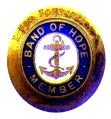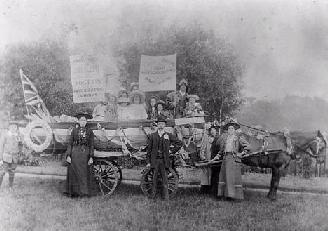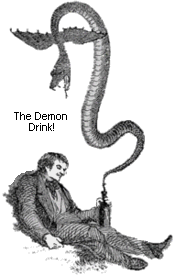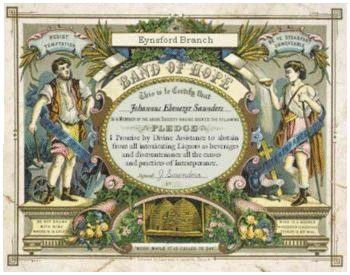|
|||||||
Navigation |
|||||||
|
|||||||
The history of Eynsford Baptist Church, 1940-1950. |
|
The Deacons of the day may have resolved what they considered to be the issue of their young Pastor, but had failed to do anything concerning the rubbish at the back of Church. The R.D.C. wrote to them again, and suggested a dustbin be purchased, which could be emptied weekly. The Deacons agreed to the purchase of a Dustbin. The Manse garden for which the Pastor had asked for assistance was by May of 1941, in a very poor state, which had to be remedied by paying for it to be put in order. It was learnt that the Reverend Stanley Thomas, who was one of the supply preachers for the interregnum was seeking a change, and by June had been invited to the Pastorate. The stipend for which Bertram had worked was now increased for the new Pastor by 20% to £240! Pastor Thomas was able to take somewhat of a greater command of the situation, and provided an upbeat spirit to the Church, by encouraging them to prepare for the ter-jubilee (150 years) anniversary. He stated "that all was well in hand and that" the Church "could look forward to a great time"! A further positive suggestion was that of sending a letter to those members on active service, with news of the Church and Village and other items of interest. However falling on deaf ears was a proposal to appoint district visitors to assist in pastoral concerns! A matter which the Pastor allowed to be withdrawn. At the Deacons' meeting early 1944, it was agreed to recommend to the Church meeting, that they ask "Mr Thomas to continue his pastorate… for an indefinite period and that his stipend be increased"! With an eye to evangelism, and to continue pastoral care, at the meeting on the 7th March 1945, Pastor Thomas propose that letters be drafted to those serving in the forces, with a welcome back into fellowship and that they had "on the front page a photograph of the Church with doors open". Given the losses due to those being called away to the forces, and life never being the same following the war, the Church had maintained its strength from its pre-war position of the membership being around the 100 mark. In 1947 the membership figure is recorded as being 98. There is evidence that Pastor Stanley Thomas worked well with Churches of other denominations. He got the Deacons to agree that other Churches could use the premises for refreshments at a rate of 10/- (10 shillings - 50p). For the 1948 Church Anniversary, Canon Mitchel of Dartford, The Vicar of Eynsford and the Rector of Lullingstone were invited to the Tea held during the Church Anniversary celebrations. Amongst Evangelical Christians this would have been known as being "interdenominational" as opposed to the more liberal term of "ecumenical"! Pastor Thomas also gained the use of Students as supply Preachers allowing them some experience and for which the Church paid each student £2-10-00 (£2-50). Not neglected was the silent and inexpensive witness of "Wayside Pulpit Notices" of which a fresh supply was ordered in July 1947. |
|
Jabez Tunnicliffe, founder of the Band of Hope had been a member of the Hunslet Baptist Church (near Leeds). He and Mrs Ann Jane Carlile had founded the organisation in 1847. This Christian organisation provided activities for children and adults that encouraged them to avoid alcohol. 'Signing the pledge' to abstain from alcohol became one of the 'hallmarks' of the organisation. The misuse of alcohol in the late 1800s and early 1900s was very real. The wording on the pledge cards read; "I Promise by Divine Assistance to abstain from all intoxicating Liquors as beverages and discountenance all the causes and practices of Intemperance". The organisation today is called "Hope UK" and deals with the issue of the dangers of drugs. |
|
In Eynsford in times past the Temperance movement had an Apostle. The Band of Hope had influenced such people as the writer, journalist and educator; Arthur Mee. He is best known for The Children's Encyclopedia and The King's England. He was a Baptist, and carried his Christian convictions into his work. He lived on Eynsford Hill.
|
|
Band of Hope Pledge Card |
|
Arthur had founded the "Strength of Britain Movement" at the Hotel Cecil in June 1916. A "Memorial", or petition, was signed by 2448 men and women of influence and delivered to the Prime Minister in Downing Street on 5 April 1917. Arthur turned himself into a one-man Temperance pamphlet factory, working from his beautiful hilltop home in Eynsford Hill, and the introductory volume Defeat? (later reissued as Defeat or Victory?) was swiftly followed by The Fiddlers and The Parasite. Hundreds of thousands of these pamphlets were sold, although they were considered so inflammatory that they were banned in Australia and South Africa, and simply owning a copy in Canada was an offence punishable by five years in jail! The Manse had sustained war damage, which was under a government scheme put right in June 1948. In that year, the lack of space in the graveyard adjoining the Church, had taxed the minds of the Deacons, and they sought to obtain a new village cemetery using a spare piece of land adjoining the Vicarage, known as the "Jolly Hawgh". However nothing was settled. In September 1948, one of the Church members -William Rogers who had died bequeathed £250-00 for the "purchase of an additional burial ground". The money was deposited with the Baptist Union. In the following year, the money had been paid by the Baptist Union into the Church Reserve fund for repairs and renovations and was soon spent on fabric - but not on a burial ground. The Church had taken the view that it was the local Council's responsibility to provide burial space - which was very true! The generous bequest had its downside. At the Deacons meeting 1st June 1949, it was reported that owing to the loss by death, and some members had moved out of the area, the "financial position was rather low". The burial ground issue continued to occupy the deacons, and at the same meeting, the levelling of the burial ground for re-use after seven years was discussed but abandoned when it was pointed out that a number of graves were still attended. The following year the matter was still one for discussion, and on the 11th October 1950, it was reported that only 5 grave spaces were left. A Mrs Wren offered to write a history of the Church, and this was accepted but later minute books reveal nothing further about this. These discussion items paled at the meeting when Stanley Thomas announced he had been called to the Pathhead Baptist Church in Kirkcaldy in Scotland. The next meeting on the 28th October listed the fees to be paid: Visiting Minister £4, Students £2 and lay Preachers their expenses! The minute books of the Church, also reveal facts about social history. For example the late 1940s and early 1950s was still an age where traditional names were used for certain days - such as St Luke's Day, Whit Sunday & etc. These appear in the minutes.
|
|
History of the Church Chapter 1-1: 1775-1905
![]()
History of the Church Chapter 1-2: 1775-1905
![]()
History of the Church Chapter 2: 1905-1906
![]()
History of the Church Chapter 3: 1905-1938
![]()
History of the Church Chapter 4: 1938-1940
![]()
History of the Church Chapter 6: 1950-1960
![]()
History of the Church Chapter 7: 1960-1969
![]()
History of the Church Chapter 8: 1969-1980
![]()
History of the Church Chapter 9: 1981-1989
![]()
History of the Church Chapter 10: 1990-1999
![]()
History of the Church Chapter 11: 2000-2009
![]()
![]() Click to return to the Home Page
Click to return to the Home Page

 In December 1947, at the Deacons meeting it was proposed that
the "Band of Hope" could be recommenced at the Church.
In December 1947, at the Deacons meeting it was proposed that
the "Band of Hope" could be recommenced at the Church.


